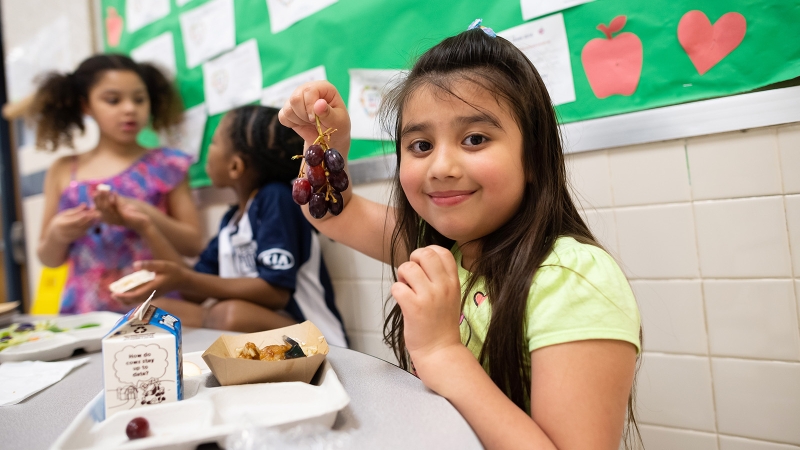Child Abuse and Neglect
Fairfax County Public Schools is committed to the safety and well-being of all students.
The Code of Virginia requires all public schools employees to report suspected child abuse or neglect. In FCPS, our teachers and staff have been trained in best practices and legal requirements regarding mandated reporting of suspected abuse.
- View a Mandated Reporting Tip Sheet from the Fairfax County Department of Family Services.
- View Regulation 2215 -Procedures for Reporting Cases of Suspected Child Abuse or Neglect
If you suspect a child is being abused or neglected, call the Fairfax County Child Protective Services (CPS) hotline at 703-324-7400. You may give your name or remain anonymous.
Mandated Reporter Portal
The Virginia Department of Social Services’ (VDSS) Division of Family Services (DFS) has launched a Mandated Reporter Portal effective October 30, 2020. The portal provides a streamlined and easily accessible way for Mandated Reporters in Virginia to submit reports of suspected child abuse and neglect. It can be accessed at https://vacps.dss.virginia.gov/.
View an infomercial that provides an overview of the new portal.
Fairfax County Child Protective Services is still responsible for receiving reports of child abuse and neglect; determining the validity of CPS reports; and providing services that enhance child safety and prevent further abuse and neglect.
What is Child Abuse?
Child abuse is when a parent or caregiver, whether through action or failing to act, causes injury, death, emotional harm or risk or serious harm to a child. There are many forms of child maltreatment, including physical abuse, neglect, sexual abuse and emotional maltreatment.
When a parent or caregiver causes any non-accidental physical injury to a child.
Physical Indicators:
- Bruises
- Multiple injuries in various stages of healing
- Injuries regularly appearing after absence, weekend, etc.
- Unexplained injuries
- Clustered injuries that form patterns, which reflect the share of article used to inflict injury
Behavioral Indicators:
- Reports injury by caregiver
- Complains or soreness or moves uncomfortably
- Uncomfortable with physical contact
- Wears clothing inappropriate to weather or reluctant to change clothes
- Behavior extremes e.g. withdrawn, aggressive
- Afraid to go home or frightened of parents
When a parent or caregiver does not give the care, supervision, affection and support needed for a child’s health, safety and well-being.
Physical Indicators:
- Consistent hunger
- Poor hygiene
- Unattended physical problems or medical needs
- Inadequate supervision
- Abandonment
Behavioral Indicators:
- Reports no caretaker at home
- Begs or steals food
- Frequently absent or tardy
- Constant fatigue listlessness, or falling asleep in class
- Extended stays at school (early arrival and late departure)
When an adult uses a child for sexual purposes or involves a child in sexual acts.
Physical Indicators:
Most physical indicators of child sexual abuse would be found by an exam by a medical practitioner. Other professionals rely more upon behavioral, emotional and cognitive/academic indicators in determining whether to suspect sexual abuse.
Behavioral Indicators:
- Reports sexual abuse
- Highly sexualized play
- Detailed, age inappropriate understanding of sexual behavior
- Chronic runaway
- Sudden noticeable behavior changes
- Deterioration in academic performance
When a parent or caregiver harms a child’s mental and social development, or causes severe emotional harm.while a single incident may be abuse, most often emotional abuse is a pattern of behavior that causes damage over time.
Physical Indicators:
- Learning problems
- Developmental Delays
- Speech disorders
- Frequent stomach aches, headaches or unexplained weight fluctuations
Behavioral Indicators:
- Habit disorders e.g. thumb sucking, biting, rocking in older children
- Behavior extremes
- Appears to derive pleasure from hurting others or animals
- Anti-social, destructive
- Delayed adaptive behavior skills
What To Do When a Child Discloses Abuse?
- Stay calm.
- Remember that the safety and well-being of the child comes before the interests of any other person.
- Listen to the child but do not investigate by asking too many questions or having multiple people talk with the child.
- Do not take pictures or look for injury under clothing.
- Report what the child says in their own words – do not make inferences.
Child Abuse Prevention Guidelines
From Childhelp
- Never discipline your child when your anger is out of control.
- Participate in your child’s activities and get to know your child’s friends.
- Never leave your child unattended, especially in the car.
- Teach your child to use their voice to allow them to prevent abuse in their own life.
- Ask questions; for example, when your child tells you he or she doesn’t want to be with someone, this could be a red flag.
- Listen to them and believe what they say.
- Be aware of changes in your child’s behavior or attitude and inquire into it.
- Teach your child what to do if you and your child become separated while away from home.
- Teach your child the correct names of his/her private body parts.
- Be alert for any talk that reveals premature sexual understanding.
- Pay attention when someone shows greater than normal interest in your child.
- Make certain your child’s school or day care center will release him/her only to you or someone you officially designate.
Additional Resources
Both schools and families play important roles in creating safe, nurturing and supportive environments for children to grow into healthy, resilient adults. The resources below provide additional information on developing healthy families, prevention programming, the signs and symptoms of child abuse and neglect, and how to report suspected abuse.
Centers for Disease Control (CDC) Child Abuse and Neglect Prevention
CDC’s research and programs work to understand the problem of child abuse and neglect and prevent them before they begin.
Fairfax County Child Abuse and Neglect Prevention Services provide community-based prevention and early intervention services to strengthen families, promote healthy family functioning and encourage families to become self-reliant.
- Parenting Education Classes
Free classes that teach positive and effective ways parents can interact with their children at every age and stage of development. - Fairfax County Child Supervision Guidelines
Supervision guidelines for parents and caretakers to consider before leaving a child alone. - Mandated Reporter Tips
A reference for mandatory reporters when making a Child Protective Services (CPS) report.
SCAN of Northern Virginia
SCAN stands for Stop Child Abuse Now. SCAN of Northern Virginia works throughout the region to develop effective child abuse and neglect prevention programming for all children and families.
- What is child abuse & neglect?
Learn the signs of child abuse and neglect and how to report suspected abuse. - Parenting Can Be Tough
SCAN Family Programs offer a safe space to talk through parenting challenges and strengthen positive and healthy parenting habits.
Virginia Department of Education - Child Abuse and Neglect Information
The Virginia Board of Education developed Guidelines for the Prevention of Sexual Misconduct and Abuse in Virginia Public Schools.


